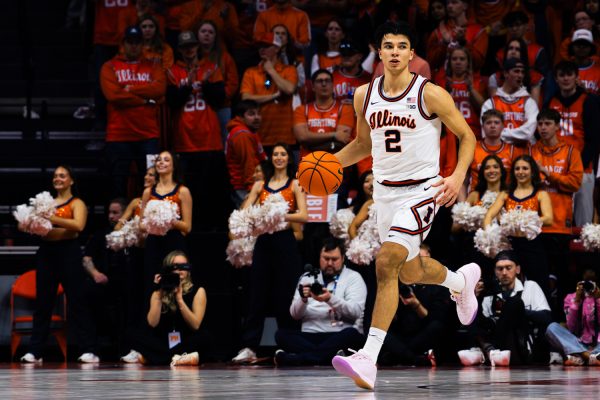ISS aims to increase student involvement
Feb 26, 2007
Last updated on May 12, 2016 at 08:19 a.m.
With student elections coming up March 6 and 7, campaign posters and Facebook groups are beginning to draw campus attention to the Illinois Student Senate.
Comprised of undergraduate and graduate students from every campus unit, ISS ostensibly acts on behalf of the entire student body and partners with faculty and administrators to influence the way that the University is run.
The trouble is, very few students seem to know exactly what the Senate does. All weekly meetings are public, but the gallery almost always sits empty.
“I think a lot of students are apathetic, which is natural,” said Katie Hamilton, junior in Communications and ISS press secretary. “We don’t have the involvement or the presence that I think we want.”
Get The Daily Illini in your inbox!
It is important for students to be engaged in their student government and to understand the role that ISS plays in the governance of the University, said Ryan Ruzic, senior in LAS and student body president.
“If there’s any group of students that makes a difference on this campus, it’s us,” Ruzic said.
Hamilton said student involvement is crucial.
“We are the voice of the student body, technically,” Hamilton said. “We come from each college, and what we say and do does have an impact and has had an impact.”
The Senate serves at least two important functions in the administration of the University. Student representation is the chief concern of the deliberative body, which is divided into committees that deal with specific aspects of academic and campus affairs. If a student is facing expulsion, there will be ISS members on the committee that votes on whether or not the student will be dismissed. Similarly, if a new major or minor is created, student senators will also have a hand in that process.
“We’re not the only ones that have a say,” Ruzic clarified. “But there are students in the room when decisions like that are made.”
In addition, each member of ISS serves on the Student/Faculty Senate, also known as the U-C Senate, which holds monthly meetings and is comprised of about 200 faculty members and 50 students. While the majority clearly rests with the faculty, students still have a voice in the way decisions are made. U-C Senate decisions, coupled with the leadership of administrators such as Chancellor Richard Herman and President B. Joseph White, dictate University policies. This is known as “shared governance.”
“It’s really a great experience, and a wonderful way of doing things,” White told students and faculty at this month’s Senate meeting. “Shared governance results in (better plans). It also results in ownership. This is a ‘we’ proposition.”
Aside from student representation, student advocacy is a major function of ISS. Each year, delegates travel to Springfield in order to lobby the state on behalf of student concerns and programs.
In order to accomplish these goals, ISS is afforded a significant budget by the University. This is another reason for students to be involved, so they can have a say over where their money is going, Ruzic said.
“We have direct control over about $40,000,” Ruzic said. This is spent on a variety of ISS programs, from lobbying trips to student forums and more. “We also have input, but not direct control, over most of the student fees and tuition.”
With an understanding of the role that student government plays and the significant responsibilities afforded to ISS delegates, students should make sure their voice is heard, Hamilton said.
“Every student can be involved,” she said. “You don’t even have to be a senator; you can serve on committees or be a staffer. We really need input from everybody.”





